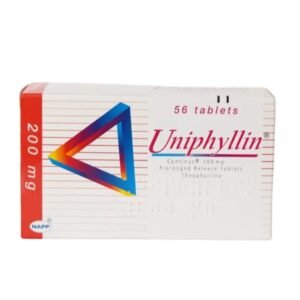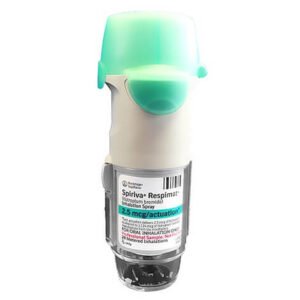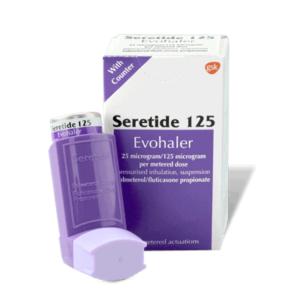About Salmeterol
Salmeterol is called a bronchodilator because it widens (dilates) your airways. It works by opening up the air passages in your lungs so that air can flow into your lungs more freely. This helps to ease symptoms such as coughing, wheezing and feeling breathless. It is prescribed to relieve airways-related problems in people who have asthma or chronic obstructive pulmonary disease (COPD). Salmeterol is called a long-acting bronchodilator. Its effects are usually felt within 20 minutes and last for around 12 hours.
How should this medicine be used?
Salmeterol comes as a dry powder to inhale by mouth using a specially designed inhaler. When salmeterol is used to treat asthma or COPD, it is usually used twice a day, in the morning and evening, about 12 hours apart. Use salmeterol at around the same times every day. When salmeterol is used to prevent breathing difficulties during exercise, it is usually used at least 30 minutes before exercise but not more often than once every 12 hours. If you are using salmeterol twice a day on a regular basis, do not use another dose before exercising. Follow the directions on your prescription label carefully, and ask your doctor or pharmacist to explain any part you do not understand. Use salmeterol exactly as directed. Do not use more or less of it or use it more often than prescribed by your doctor.
Do not use salmeterol to treat sudden attacks of asthma or COPD. Your doctor will prescribe a short-acting beta agonist medication such as albuterol (Accuneb, Proair, Proventil, Ventolin) to use during attacks. If you were using this type of medication on a regular basis before you began treatment with salmeterol, your doctor will probably tell you to stop using it regularly but to continue to use it to treat sudden attacks of asthma symptoms. Follow these directions carefully. Do not change the way you use any of your medications without talking to your doctor.
Other uses for this medicine
Never exhale into the inhaler, take the inhaler apart, or wash the mouthpiece or any part of the inhaler. Keep the inhaler dry. Do not use the inhaler with a spacer.
This medication may be prescribed for other uses; ask your doctor or pharmacist for more information.
What side effects can this medication cause?
Salmeterol may cause side effects. Tell your doctor if any of these symptoms are severe or do not go away:
- shaking of a part of your body that you cannot control
- headache
- nervousness
- dizziness
- cough
- stuffed nose
- runny nose
- ear pain
- muscle pain, stiffness, or cramps
- joint pain
- sore, irritated throat
- flu-like symptoms
- nausea
- heartburn
- tooth pain
- dry mouth
- sores or white patches in the mouth
- red or irritated eyes
- difficulty falling asleep or staying asleep
- burning or tingling of the hands or feet
Some side effects can be serious. If you experience any of the following symptoms, call your doctor immediately:
- fast or pounding heartbeat
- chest pain
- rash
- hives
- swelling of the face, throat, tongue, lips, or eyes
- hoarseness
- choking or difficulty swallowing
- loud, high-pitched breathing
Salmeterol may cause other side effects. Call your doctor if you have any unusual problems while you are taking this medication.
What special precautions should I follow?
Before using salmeterol,
- tell your doctor and pharmacist if you are allergic to salmeterol, any other medications, milk protein, or any foods.
- tell your doctor if you use another LABA such as arformoterol (Brovana), fluticasone and salmeterol combination (Advair), formoterol (Perforomist, in Bevespi Aerosphere, Duaklir Pressair, Dulera, Symbicort), indacaterol (Arcapta), olodaterol (Striverdi Respimat, in Stiolto Respimat), or vilanterol (in Anoro Ellipta, Breo Ellipta, Trelegy Ellipta). These medications should not be used with salmeterol. Your doctor will tell you which medication you should use and which medication you should stop using.
- tell your doctor and pharmacist what prescription and nonprescription medications, vitamins, nutritional supplements, and herbal products you are taking. Be sure to mention any of the following: antifungals such as itraconazole (Onmel, Sporanox, Tolsura) and ketoconazole; beta blockers such as atenolol (Tenormin, in Tenoretic), labetalol (Trandate), metoprolol (Kapspargo, Lopressor, Toprol XL, in Dutoprol), nadolol (Corgard, in Corzide), and propranolol (Hemangeol, Inderal, Innopran); clarithromycin; diuretics (‘water pills’); HIV protease inhibitors such as atazanavir (Reyataz, in Evotaz), indinavir (Crixivan), nelfinavir (Viracept), ritonavir (Norvir, in Kaletra, Viekira Pak), and saquinavir (Invirase); nefazodone; and telithromycin (Ketek). Also tell your doctor or pharmacist if you are taking the following medications or have stopped taking them within the past 2 weeks: antidepressants such as amitriptyline, amoxapine, clomipramine (Anafranil), desipramine (Norpramin), doxepin (Silenor, Zonalon), imipramine (Tofranil), nortriptyline (Pamelor), protriptyline (Vivactil), and trimipramine (Surmontil); and monoamine oxidase (MAO) inhibitors including isocarboxazid (Marplan), linezolid (Zyvox), phenelzine (Nardil), rasagiline (Azilect), selegiline (Emsam, Zelapar), and tranylcypromine (Parnate). Your doctor may need to change the doses of your medications or monitor you carefully for side effects.
- tell your doctor if you have or have ever had an irregular heartbeat, high blood pressure, QT prolongation (an irregular heart rhythm that can lead to fainting, loss of consciousness, seizures, or sudden death), diabetes, seizures, or liver, thyroid, or heart disease.
- tell your doctor if you are pregnant, plan to become pregnant, or are breastfeeding. If you become pregnant while using salmeterol, call your doctor.
- you should know that salmeterol inhalation sometimes causes wheezing and difficulty breathing immediately after it is inhaled. If this happens, call your doctor right away. Do not use salmeterol inhalation again unless your doctor tells you that you should.
What special dietary instructions should I follow?
Unless your doctor tells you otherwise, continue your normal diet.
What should I do if I forget a dose?
Skip the missed dose and continue your regular dosing schedule. Do not inhale a double dose to make up for a missed one.







Reviews
There are no reviews yet.